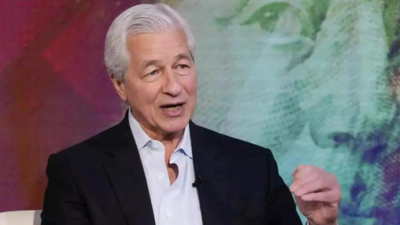ARTICLE AD BOX

MUMBAI: He's been called America's most powerful banker, a man whose words are taken seriously by markets and policymakers around the world. Jamie Dimon is more than just chairman and CEO of JP Morgan, US's largest bank, he's become synonymous with it as it draws closer to becoming the first in the industry with a trillion-dollar valuation.So when TOI met him for an exclusive interview, the first questions were about Trump, tariffs, H-1B visas, India-US relations and geopolitics - before moving to the state of the economy in the two countries as well as globally."I'm in the free trade camp," he said straight off the bat, "except when it comes to national security", before adding, "There's also long-standing unfair trade, where industries get protected and political forces resist change."Asked what it would take to get a trade deal, he said, "I hope President Trump and PM Modi, who seem to respect each other, can reach an agreement. I see India as a natural friend of America. I don't think we need to ask you to align; we should extend our hand, build relationships. The Ukraine war has created big problems...we feel strongly Russia's doing bad things and must be stopped. Trade will feel the pressure from that.
"H-1B announcement came out of the blue, says Dimon On Trump's weekend shocker on H-1B visas, Jamie Dimon said, "It came out of the blue. We'll be engaging with stakeholders and policymakers. For us, visas matter because we move people around globally - experts who get promoted to new jobs in different markets.""The challenge is that the US still needs to remain an attractive destination. My grandparents were Greek immigrants who never finished high school. America is an immigrant nation, and that's part of its core strength," he added.On the broader issue of tariffs and their impact on the economy, he said, "I think tariffs are modestly inflationary. I'm not sure they're just a one-time effect. Some people say that, but in reality they'll come in pieces, not all at once. If they did come in immediately, you'd see a quick spike up and then down. All things being equal, it's a little recessionary, but really just one straw on the camel's back."Turning to the Indian economy, Dimon, who's been coming to the country for 20 years, said, "I'm very optimistic about its future.
The economy has been growing at 6%, and that could and should continue for 20 years. The bigger caveat is the world order: India has benefited from a peaceful global system, even as you face your own local challenges.""I think the reforms here are excellent, and the fact that your Prime Minister was able to get them done shows strong leadership. He's been a successful Prime Minister. And you're seeing similar shifts elsewhere: PM Starmer in the UK, Scholz in Germany, Macron in France, Meloni in Italy.
They all want growth and investment, and they understand that being completely anti-business and anti-investment is not a good strategy for growing an economy.His biggest worry? "That 30 years from now, we may read a book titled 'How the West Was Lost'. It could describe how, starting with Russia's invasion of Ukraine and terrorism in West Asia, Iran, Russia, North Korea - with some help from China - were able to dismantle the post-World War II order of law and stability. That system had been quite successful, and you benefited from it too. In this scenario, the world fragments into competing power blocs and bilateral alliances, resembling the pre-World War I or pre-World War II era, where every nation has to figure out how to protect itself.
And in that environment, the strongest nation - China - could leave others acting as its vassals."



.png)
.png)
.png)
















 1 hour ago
4
1 hour ago
4









 English (US) ·
English (US) ·